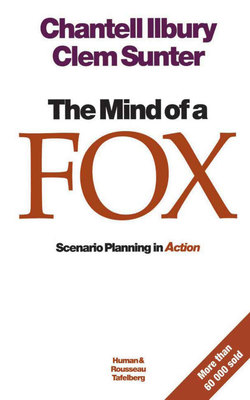Читать книгу The mind of a fox - Clem Sunter - Страница 5
На сайте Литреса книга снята с продажи.
Introduction to the Third Impression
ОглавлениеWe normally associate 911 with an emergency call. It also represents September 11. At 8:45 am (New York time) on that day in 2001, the world changed forever. This was the moment when the first of two hijacked planes slammed into the World Trade Center. Another one hit the Pentagon and a fourth crashed in Pennsylvania. No terrorist attack has ever caused such a shock. The unthinkable had happened – and it wasn’t a movie.
When we wrote this book in the first part of 2001, we included a letter to President Bush. In it, we warned him that the key uncertainty during his tenure was nuclear terrorism, more specifically the possibility of terrorists planting a nuclear device in a Western city. While the tools of destruction and method of delivery were different to what we had envisaged, the impact was just as devastating. Nothing could have demonstrated the power of scenario planning more effectively than this terrible tragedy. We could never have captured it in a forecast, but it was possible to provide a warning in the form of a scenario.
Indeed, the logic contained in our two scenarios – “Friendly Planet” and “Gilded Cage” – is now more pertinent than ever. The natural temptation for the “rich old millions” in the West must be to batten down the hatches and isolate themselves in a Gilded Cage. We all know that security is the most basic of all human needs. However, this could lead to an even more divided world as the gap between the “rich old millions” and the “poor young billions” widens further. The increasing tension and stress associated with this scenario will ironically make it more likely than before that another evil act of the same – or perhaps even greater – magnitude will be perpetrated by terrorists. No advances in technology, no improvements in intelligence and security management systems can render an individual nation impregnable against attack. The terrorist will always find a chink in the bars of the cage, however thick you make them, to pass through and commit his foul deed. Moreover, the knowledge of how to manufacture weapons of mass destruction is itself indestructible. And it will continue to spread. Meanwhile, inside the cage, a superabundance of soft targets awaits the terrorist. The growing interdependencies and networks of a modern society make it increasingly vulnerable to dislocation and attack, particularly by people who are prepared to die in the process.
The only way to minimise – not entirely eliminate – the threat of further outrages is for America to take the lead in building a Friendly Planet. This involves more than a military victory over the terrorists. The realisation has to dawn that to be a secure winner, you cannot be surrounded by resentful losers. The preferred scenario is therefore one in which, as we say in the book, “the rich old millions resolve to find common ground with the poor young billions to eradicate poverty and disease, to tackle problems of the environment, to bring international criminal syndicates to justice and to root out dangerous terrorist organisations.” Otherwise, the future is bleak. Anything goes. And it would be unwise to dismiss any 911 call as a hoax.
Chantell Ilbury
Clem Sunter
September 2001
